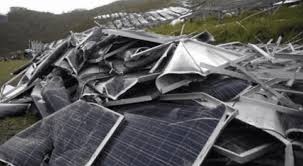“Report Warns India Could Accumulate 340kt of Solar Waste by 2030”
A recent report by the Council on Energy, Environment, and Water (CEEW) has sounded the alarm on India’s burgeoning solar waste issue, projecting that the country could accumulate up to 340 kilotonnes (kt) of solar waste by 2030. This warning comes amidst India’s ambitious renewable energy targets and its push towards a greener future.


A recent report by the Council on Energy, Environment, and Water (CEEW) has sounded the alarm on India’s burgeoning solar waste issue, projecting that the country could accumulate up to 340 kilotonnes (kt) of solar waste by 2030. This warning comes amidst India’s ambitious renewable energy targets and its push towards a greener future.
India’s installed solar energy capacity has soared to 66.7 gigawatts (GW) as of 2023, driven by rapid growth in the sector. However, this success story has a flip side, with approximately 100 kilotonnes of solar waste already generated and expected to triple within the next decade, reaching 340 kt by 2030.
The report highlights that around 67% of this solar waste is anticipated to be generated in five states: Rajasthan (24%), Gujarat (16%), Karnataka (12%), Tamil Nadu, and Andhra Pradesh. This concentration underscores the need for targeted waste management strategies in these regions.
India’s commitment to achieve 50% of its installed power capacity from non-fossil sources by 2030, as outlined in its nationally determined contribution (NDC) to the United Nations Framework Convention on Climate Change, emphasizes the critical role of solar energy in the country’s energy transition. However, the rapid growth in solar installations also brings about challenges in waste management that cannot be ignored.
Arunabha Ghosh, CEO of CEEW, emphasized the importance of proactive measures to address solar waste, stating that it is not just an environmental concern but also a strategic necessity for energy security and building a circular economy. He noted the significant growth in solar capacity and stressed the need for robust recycling mechanisms to safeguard renewable ecosystems and promote green job creation.
Solar waste encompasses discarded modules and scrap from manufacturing processes, posing challenges related to proper handling and recycling. Improper disposal can lead to environmental hazards due to the leaching of toxic materials like lead and cadmium.
The CEEW report recommended measures such as maintaining a database of installed solar capacity, issuing guidelines for solar waste collection and storage, and promoting recycling through mechanical, thermal, and chemical processes. These efforts aim to recover valuable materials and reduce the environmental footprint of solar energy production.
Sources By Agencies








**mitolyn reviews**
Mitolyn is a carefully developed, plant-based formula created to help support metabolic efficiency and encourage healthy, lasting weight management.